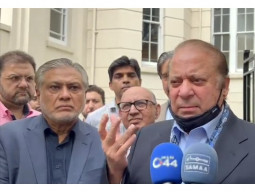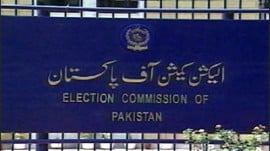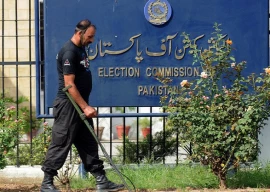1654229864-0/image-(14)1654229864-0.png)
A legal debate has started whether the sword of disqualification is still hanging over PTI Chairman Imran Khan on account of submitting false certificates as declared by the Election Commission of Pakistan (ECP).
Earlier in the day, the electoral watchdog held that Imran for financial year – 2008-09 to 2012-13 (five years) – had submitted Form-1 which was found to be grossly inaccurate on the basis of financial statements obtained by it.
"This Commission is constrained to hold that Mr Imran Khan failed to discharge his obligations as mandated under the Pakistani Statutes. The Chairman PTI has or successive five years (2008-2009 to 2012-2013) under review and examination has submitted Form-1 and signed a Certificate which is not consistent with [the] accounting information before us which has been gathered and complied on the basis of information obtained from Banks through [the] State Bank of Pakistan," the ECP judgment said.
The Supreme Court in PML-N leader Hanif Abbasi case did not shut door to examine the matter related to submission of false certificates by Imran Khan to the ECP. The top court kept the door open to adjudicate the question on disqualification of Imran.
Former chief justice of Pakistan Mian Saqib Nisar while authoring judgment held that it was a settled law that where the law requires something to be done in a particular manner must be done in that manner.
"Another important canon of law is that what cannot be done directly cannot be done indirectly.
Therefore, as mentioned above, before any finding by a Court of law can be given as to whether a certificate issued by a head of a political party under Article 13(2) of the PPO is false or not, the question whether that political party has either received contributions or donations prohibited under Article 6(3) supra or is a foreign-aided political party in terms of Article 2(c) supra must respectively be addressed and determined by the competent forum."
The top court observed had observed that subject to an adverse finding and corresponding penal action taken under the PPO, the issue of the falsity of the certificate under Article 13(2) would then be ascertainable as a secondary fact by a competent Court of law.
Accordingly, it would be appropriate for this Court not to exercise its jurisdiction under Article 184(3) of the Constitution so as to avoid interfering with the power and jurisdiction specifically conferred by the PPO upon the special fora i.e. the Federal Government and the ECP respectively, the judgment said.
This is more-so the case when the petitioner himself, relies upon Article 2(c)(iii) and 6(3) PPO for seeking relief from this Court but has failed to approach the respective fora provided under the law for such relief.
In view of the non-determination of the primary facts by the competent fora, we are not inclined to adjudicate the relief claimed by the petitioner that the Respondent is disqualified under Article 62(1)(f) of the Constitution for having filed false certificates under Article 13(2) of the PPO," the judgment added.
In view of this para, it is clear that the Supreme Court refrained to pass any observation on merit of case related to submission of false certificates. However, after the ECP decision, the matter can be raised before the court of law for life time disqualification of Imran.
PTI MNA Barrister Maleeka Bokhari while talking to The Express Tribune said that it was a well settled principle that every misdeclaration or non-disclosure of personal asset would not suffice for the purposes of a 62(1)(f) permanent disqualification.
"For the purposes of current legal debate on 62(1)(f) application on alleged non-disclosure or misdeclaration by Imran Khan in certificate presented before ECP, the flawed debate being undertaken does not consider the difference between an affidavit given under oath & a mere certificate, confirming certain facts to the best of one's knowledge."
Maleeka further stated that in any event the non-disclosure or purported misdeclaration does not pertain to personal assets of the PTI chairman in his nomination papers. The subject matter in this is certification of audited accounts prepared by an auditor.
However, she said if some people without any legal understanding in law or Constitution insist on the equalisation between non-disclosure of personal assets in a nomination form and certification of party accounts before ECP, it should be noted that the "Superior court through Jurisprudence has settled in 2021 SCMR 988 & other judgments that the returned candidate would be disqualified only when if he/she had dishonestly acquired assets and was hiding them to derive certain benefits. If the non-disclosure or mis-declaration was such that it gave an illegal advantage to a candidate then it would lead to termination of his candidature. Mere fact that a candidate had not declared an asset in the nomination papers would not end in his disqualification but it had to be seen whether the act of non-disclosure of the asset was with dishonest intent or not and only if there was dishonest intent behind the nondisclosure, the candidate would be disqualified. It was the credibility of the explanation that would be the determining factor as to whether non-disclosure of an asset carried with it the element of dishonesty. All nondisclosure of assets can be read with the same eye."
"Under no application of jurisprudence on 62(1)(f) can the same be attributed to prohibited funding case before ECP," she said. Former Sindh High Court president Salahuddin Ahmed maintained that the case of Article 62 (1) (f) against Imran would be quite serious. "I think case for banning/dissolving PTI would be frivolous," he added. Another lawyer stated that false affidavit part was the only possibly serious aspect, if the powers that be want to make it serious.
During the hearing on August 1, 2017 former CJP Saqib Nisar had observed that penal consequence of collection of funds through prohibited sources was confiscation and not disqualification of party’s chief.
There is inconsistency regarding applicability of Article 62 (1) (f) of constitution. The top court had applied strict liability in Panamagate wherein former premier Nawaz Sharif was disqualified for life for non-disclosure of his assets in the nomination papers. The same was done in Jahangir Tareen’s case.
READ Nawaz urges govt to ‘immediately take action against Imran’ after ECP verdict
However, same principle was not followed in PML-N’s Khawaja Asif case. After lifetime disqualification of Nawaz and Tareen, Supreme Court in Asif’s case laid down an “objective criteria” to test the honesty of lawmakers by declaring that Article 62 (1)(f) cannot be applied to every omission or non-disclosure of assets.
In 2018, then chief justice Saqib Nisar had constituted a five-judge larger bench led by himself to examine whether or not the disqualification under Article 62(1)(f) of the Constitution was for life.
The Supreme Court had held that if it declared that a lawmaker was not “sadiq” and “Ameen” (truthful and trustworthy) under the article, then they would be permanently disqualified from contesting the elections.
However, the verdict has been criticised by senior lawyers on several grounds, including the very nature of the bench that passed the landmark ruling. The legal eagles raised objections that out of five, four judges – Saqib Nisar, Azmat Saeed Sheikh, Umar Ata Bandial and Ijazul Ahsan – of the bench belonged to Punjab.
Justice Sajjad Ali Shah, who belonged to Sindh, was also part of that larger bench. Interestingly, all “like-minded” judges were part of the benches that issued rulings in high-profile cases. Even Justice retired Sheikh Azmat Saeed, who was part of Panama bench had noted that a plain reading of Article 62(1)(f) of the constitution revealed that in order to be a member of Majlis-e-Shoora (Parliament), the person must be, inter alia, sagacious, righteous, non-profligate, honest, and ameen.
However, if there is a declaration by a court of law to the contrary i.e. he is not sagacious or righteous or non-profligate, honest, and ameen then such person shall not be qualified to be a Member of Majlis-e-Shoora (Parliament).
Justice Saeed observed that a declaration by the court of law would mean a conclusive finding. “Obviously, such finding would be with regard to a list before the Court, arising out of the violation of a law or non-fulfillment of a legal obligation. It is clear and obvious that lack of qualifications in terms of Article 62(1)(f) of the Constitution is the effect of a declaration by a Court of Law to the contrary, which is the cause.
“The obvious, legal and logical conclusion would be as long as the cause i.e. the declaration of a Court of Law holds the field, its effect i.e. the lack of qualification shall also prevail. This appears to be the only possible interpretation of Article 62(1)(f) of the constitution.”
Expansion of jurisdiction
Azmat Saeed Sheikh expanded his jurisdiction and held that it can initiate suo motu proceedings to examine the qualification of lawmakers. "We cannot abdicate our responsibility by brushing the issues floating on the surface under the carpet. Hence, we have no other option but to convert the instant proceedings into suo motu proceedings under Article 184(3) of the constitution so as to examine the cases of the parties on the basis of the material available on record so as to examine the Order of the Election Commission of Pakistan (ECP) dated June 20, 2017 by determining whether Bhatti was…disqualified or not qualified for being a member of the provincial assembly under the constitution,” stated a 31-page judgment, authored by Justice Sheikh in Shaukat Bhatti case.
In an another matter, Sheikh observed that allowing a disqualified person become member of parliament or provincial assemblies would be considered as the apex court’s failure to protect and preserve the constitution.
“Even where a matter comes before this court regarding the qualification or disqualification of a Member of the Majlis-e-Shoora or the Provincial Assemblies otherwise by way of proceedings other than under Article 184(3) of the constitution, this court not only has the jurisdiction to convert such proceedings to proceedings under Article 184(3) of the constitution but is bound to do so, as to permit an unqualified or disqualified person to continue to defile and desecrate the Majlis-eShoora or the Provincial Assemblies and masqulate as a chosen representative of the people would amount to frustrating the constitutional provisions.”
“In such an eventuality, if this court looks the other way, it would perhaps constitute a failure to protect and preserve the Constitution,” Justice Sheikh Azmat Saeed said while authoring the detailed judgment regarding the disqualification of PTI Member of Provincial Assembly (MPA) Abdul Munim in May 2018.
Later, the court set aside the lifetime disqualification of PTI Balochistan chief Yar Muhammad Rind in the fake degree case, declaring that such disqualifications must be based on oral or documentary evidence and not presumptions.
In May last year, the apex court reiterated that it was now a well-settled principle that every non-disclosure or misdeclaration would not be sufficient enough to permanently disqualify a member of parliament or a candidate under Article 62 (1) (f).
“The purpose and intention need to be seen behind the non-disclosure or misdeclaration. The returned candidate would be disqualified only when if he/she has dishonestly acquired assets and is hiding them to derive certain benefits,” an 11-page judgment authored by Justice Sayyed Mazahar Ali Akbar Naqvi stated.
The verdict was issued on a petition filed by a politician, Shamona Badshah Qaisarani, who was disqualified for lifetime over non-disclosure of her agricultural property inherited from her parents in the nomination papers.
The court said that it was the credibility of the explanation that would be the determining factor as to whether non-disclosure of an asset carried with it the element of dishonesty or not. In view of the latest judgment, several lawyers contended that Tareen could not be disqualified for life.
Justice Qazi Faez Isa had also posed seven questions to determine the eligibility criteria of lawmakers.
Senior lawyers believe that CJP Umar Ata Bandial should form full court/larger bench to review its decisions regarding lifetime disqualification of Nawaz and Tareen. If anyone approaches the apex court seeking disqualification of Imran on account of ECP findings then composition of bench will be significant to decide the matter.

1727426214-0/Tribune-Pic-(7)1727426214-0-405x300.webp)
1725189415-0/Untitled-design-(5)1725189415-0-165x106.webp)
1727423943-0/Tribune-Pic-(6)1727423943-0-165x106.webp)



1727424398-0/Copy-of-Untitled-(32)1727424398-0-270x192.webp)
1727413552-0/Copy-of-Untitled-(42)1727413552-0-270x192.webp)
1726722687-0/Express-Tribune-Web-(9)1726722687-0-270x192.webp)
1727418565-0/Copy-of-Untitled-(30)1727418565-0-270x192.webp)
1727422367-0/Copy-of-Untitled-(31)1727422367-0-270x192.webp)










COMMENTS
Comments are moderated and generally will be posted if they are on-topic and not abusive.
For more information, please see our Comments FAQ